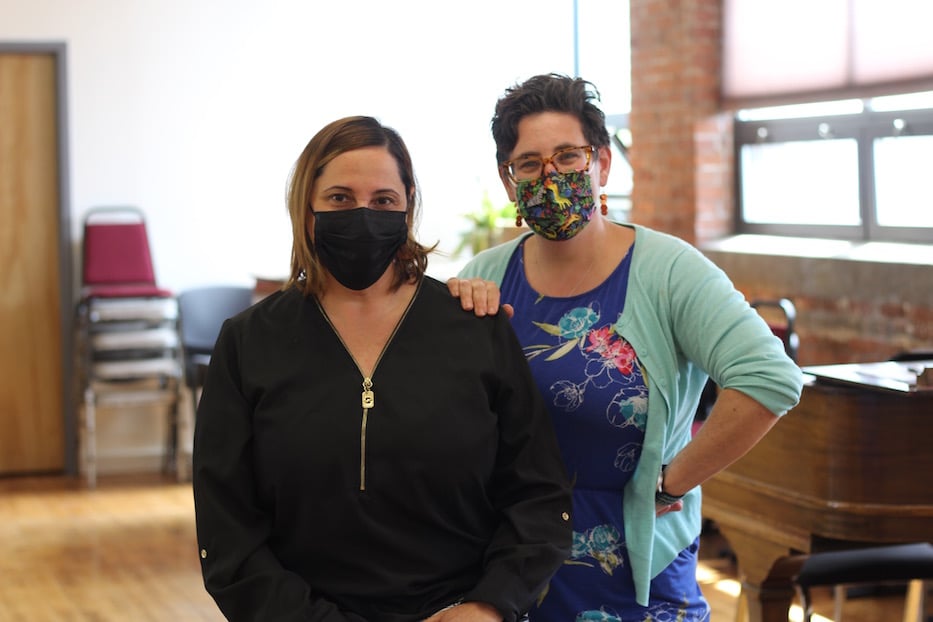
Culture & Community | East Rock | Fair Haven | Music | Arts & Culture | Music Haven | Arts & Anti-racism
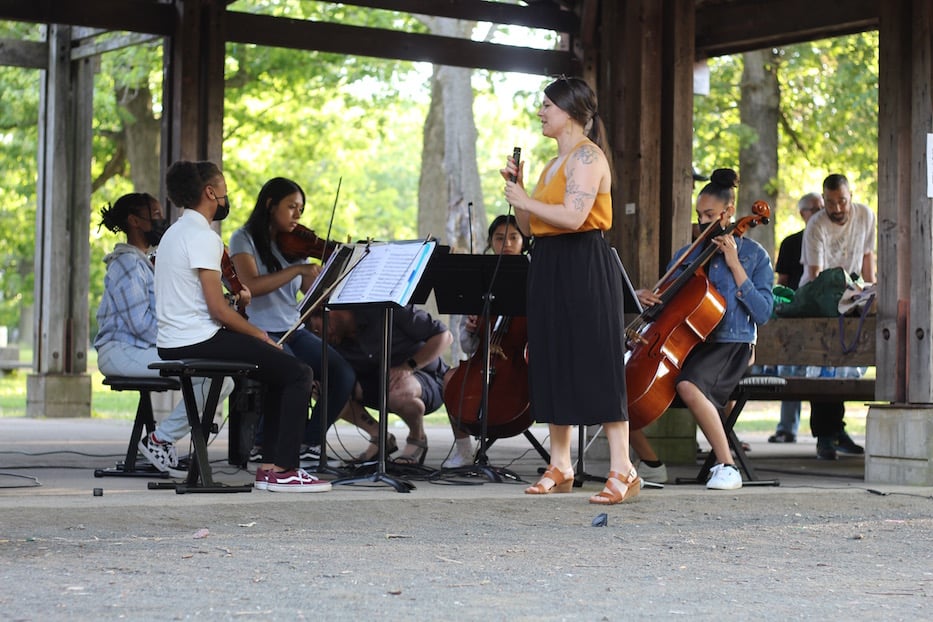
Violist and teacher Annalisa Boerner with Music Haven's student quintet. Lucy Gellman Photos.
In the sun-soaked grass of College Woods, Milda Torres McClain leaned forward in her chair, listening to each musical note. In front of her, five string students communicated in a language of raised eyebrows, flicked wrists, and quick glances. Cello slid beneath the violin, so steady it felt like it was breathing. Viola sang out in its high, sweet voice. The strings threaded through each other and wove upward.
As the final note hung in the air, McClain began to applaud, watching as an outdoor audience joined in around her. Music Haven, it seemed, was in good hands.
A daughter of Puerto Rico, the Hill and Fair Haven, McClain has been tapped as the next executive director of Music Haven, the nonprofit that teaches violin, viola, and cello to 97 students from across New Haven’s predominantly Black and brown, working class neighborhoods. This summer, she will replace outgoing co-executive director Mandi Jackson and step into the organization’s top role.
For the past year, McClain has served as co-executive director alongside Jackson, who began her tenure as executive director in 2015. Prior to that time, she was the organization’s operations manager from 2014 to 2015 and director of operations and outreach from 2015 until 2021.
Since 2015, Jackson has grown Music Haven’s operating budget by roughly $300,000, raised staff salaries, brought on more teachers, and expanded support staff several times over—often with McClain as her operational co-pilot. In a recent interview with the Arts Paper, she called it a opportune time to leave the organization, because it is in a financially stable place.
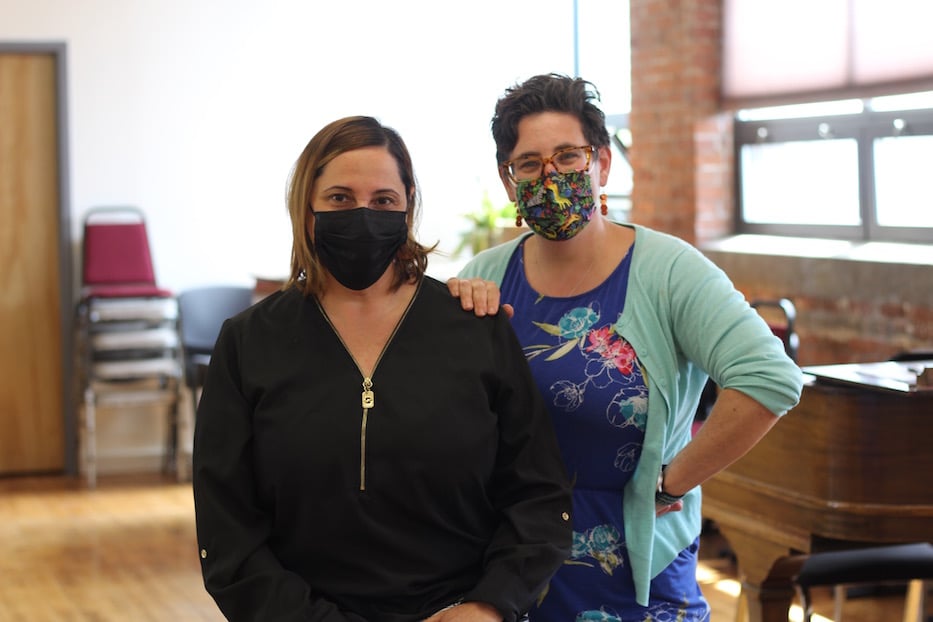
Milda Torres McClain and Mandi Jackson.
“I’m excited for the challenge,” McClain said in a recent interview at Music Haven’s Erector Square headquarters in Fair Haven. “I’m looking forward to a new adventure for sure. And sad at the same time, because I’ve been working with Mandi for so long. It’s definitely gonna be different. We’ve been through it.”
"I think in so many ways for Music Haven, it's a continuation," Jackson said in the same interview. "And I know it's very different from what leadership transitions tend to look like, especially in the arts sector, but we've always been really focused on collective voice, collective leadership."
For McClain, a fierce champion of New Haven, the transition has been years in the making. Born in Cayey, Puerto Rico, she came to New Haven as a six month old baby, after years of her father working on the farms in Woodbridge and Bethany. For the first 19 years of her life, she lived in the city’s Hill neighborhood with her two siblings and parents, first on Congress Avenue and then on Stevens Street, right at the corner of Davenport Avenue.
“It was rough” in those years, she said. Growing up in the Hill, McClain witnessed violence and substance use disorder outside her childhood home, which sits just blocks away from the Ann Street community garden and playground. There were also “happy times,” she was quick to add—but she worried about her own safety and that of her family. From her bedroom window, “I secretly envisioned a safe place where I could go,” she said. “And I didn’t have that.”
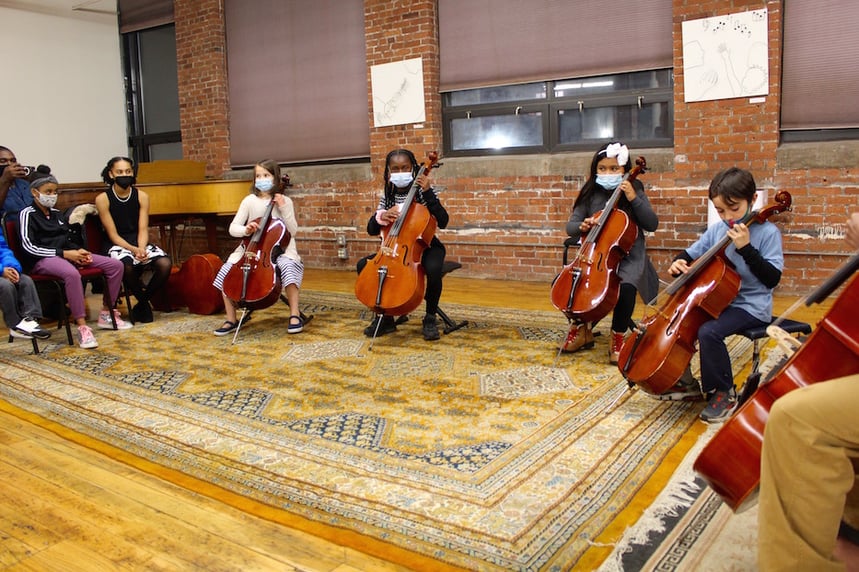
A rhapsodic "Twinkle Twinkle" from Kate Stewart, Nike Dyer, Madeline Rodriguez and Mateo Cruz at Music Haven's Peck Street space last November. Older student Max Jackson (out of the frame) assists Boulanger with the beginner class each week.
After attending Wilbur Cross High School, she studied criminal justice at the University of New Haven, then rose through the ranks in the U.S. Department of Labor and Federal Defender’s Office for over two decades. She wore several hats, she said—secretary, legal secretary, paralegal—and ultimately joined the Federal Capital Habeas Project. She stayed in New Haven, she said, because she wanted to make it a better place for the next generation.
Then one day 15 years ago, she came home and announced to her husband that she was done with the job. She quit working for the Federal Government and became a fitness coach, owner of the small business Loving Fitness 4 Life.
Still, "I always envisioned myself working in the nonprofit world, and craving that," she said.
Eight years ago, she spotted a position for a part-time operations manager at Music Haven. At the time, its offices were still on Whalley Avenue, in an old auto body garage owned by St. Luke’s Church that suffered from mice and water damage. Tina Lee Hadari, who founded the organization in 2006, was still serving as the executive director. Each day, string students would filter into the offices, filling them with a joyful sound.
From the moment she walked in, McClain said, she felt the magic “that I had been daydreaming about” all those years before.
"It was my safe happy place," she said. "And I said, 'You know what? I can do this for a long time.'"
She stayed on when Hadari left the following year, and Jackson began her tenure as executive director. At one of their first lunches together, McClain handed her a long memo about potential changes and improvements to the organization. Jackson, who estimated that it was 15 pages, couldn't believe that McClain was working part time.
"It was so thoughtful and so passionate and so smart, and I was flipping through it and I said, ‘What?! You’re part time?’” Jackson recalled with a laugh. “I was just blown away by her thoughtfulness and her passion for the organization, and that she had really thought it through. The level of care that she took … it was really extraordinary.”
Within months, McClain was full time. She moved from part- to full-time operations manager, then to director of operations, then to director of operations and outreach. Working beside Jackson, she expanded access for Spanish-language-only families, spread the word about the organization in schools and neighborhoods, and supported both Music Haven’s students and the families from which they came.
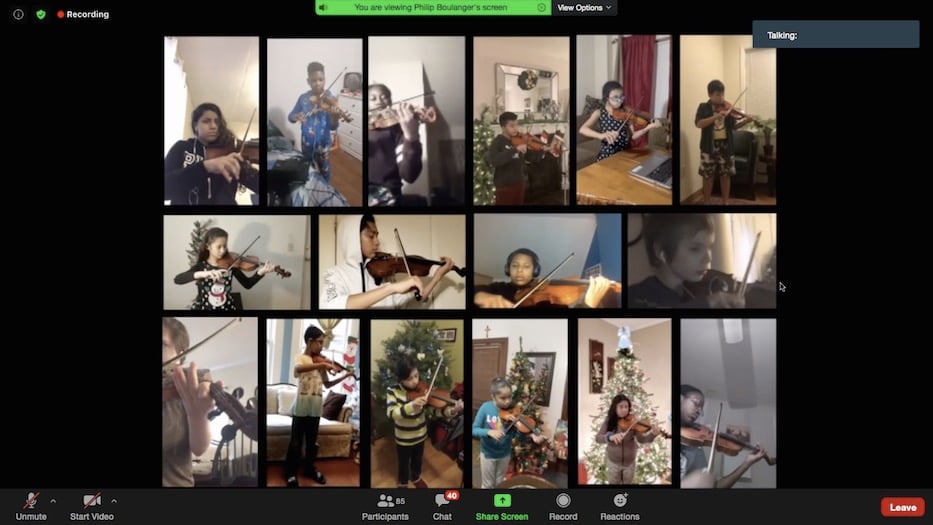
During Covid, Music Haven never stopped. Above, a still from their December 2020 concert, which was mixed and prerecorded before making its Zoom debut.
She helped keep the place running, from last minute requests to day-to-day logistics. In early 2020, she drove with Jackson to Hartford to testify on behalf of the organization, which stood to lose its brand new line item in the state budget. When Covid-19 hit New Haven three weeks later, she and Jackson worked with teachers not just to make the leap online, but also to meet families’ needs far beyond music lessons.
The two worked to make sure families had support—both logistical and financial—as waves of sickness, food insecurity, and unemployment rocked New Haven. McClain added weekly youth development meetings to her schedule, sitting on Zoom calls where she was the only non-executive-director in the room. Meanwhile, the two had very few people on support staff to help them. Something clicked in Jackson’s mind.
“Milda carried so much of that work," Jackson said. "She was doing the work of an executive director." In 2021, the two made the title official.
Since, they have continued to expand Music Haven’s budget, grow programming, bring vaccinated students back to the Fair Haven space, and score both federal relief funding, a number of grants and individual donations, and continued line item funding from the State of Connecticut. The last has been a challenge: Music Haven is the only arts nonprofit in the state that has to consistently remind state legislators that its line item exists.
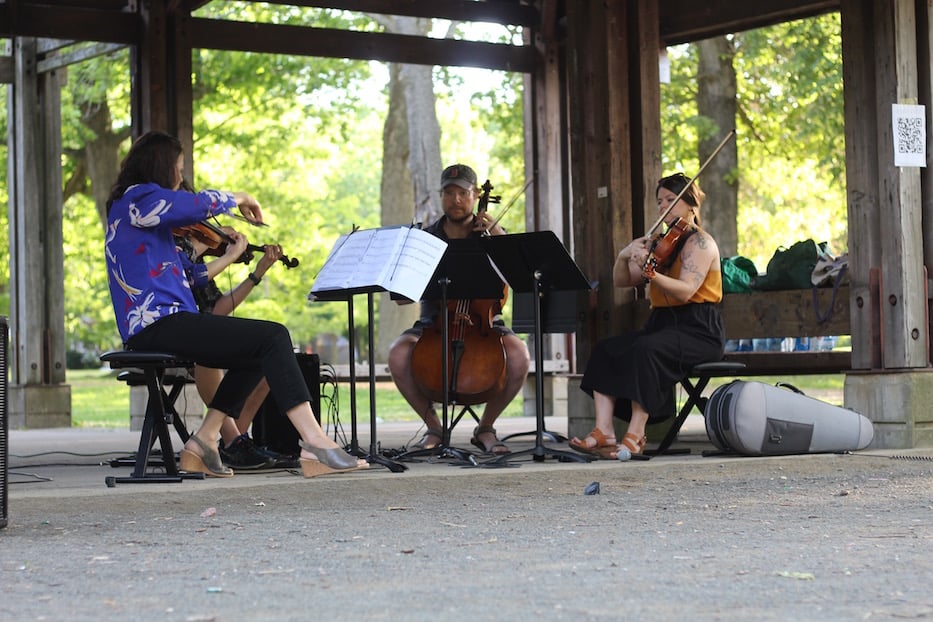
The Haven String Quartet ( Yaira Matyakubova, Gregory Tomkins, Philip Boulanger, and Annalisa Boerner) playing in College Woods in June 2022.
Jackson said that it also felt "like the right time" to leave. Since 2015, she has raised staff salaries, grown the organization's budget from $436,000 to $730,000, moved operations to a 6,700 square foot home on Peck Street, weathered a pandemic and fought for and secured a state line item multiple years in a row. The organization now has a reliable donor base, from individuals who she thinks of as "super fans" to small foundations and state and federal funding.
Under her and McClain's tenure, multiple alumni have returned to substitute teach, manage social media, and do miscellaneous tasks around the office, a model that gives them a chance to stay involved with the organization for as long as they want to. Together, the two have also spearheaded efforts to make Music Haven a more intentionally anti-racist organization. When they post a job, the first people who see it are Music Haven parents and alumni.
That strategy has worked: Development Associate Lygia Davenport and Administrative Assistant Toccara Joyce are both Music Haven parents. Communications and College and Careers Pathways Manager Alana Ladson is a Wilbur Cross grad and visual artist who grew up in New Haven. Alum Cristofer Zunun, a violinist who graduated from Cooperative Arts & Humanities High School a few years ago, sometimes steps in as a substitute teacher.
Jackson, meanwhile, said she is still figuring out what’s next for her—and is pretty comfortable with that.
“I don’t know what I’m gonna do next,” she said. “I feel like, there’s so many opportunities right now and so many things in the world that I care really deeply about, and I’m trying to figure out where to go and what to do. I’m not going anywhere. My family is here, and I’m part of this Music Haven community. So I’m not picking up and moving.”
Looking Back To Look Forward
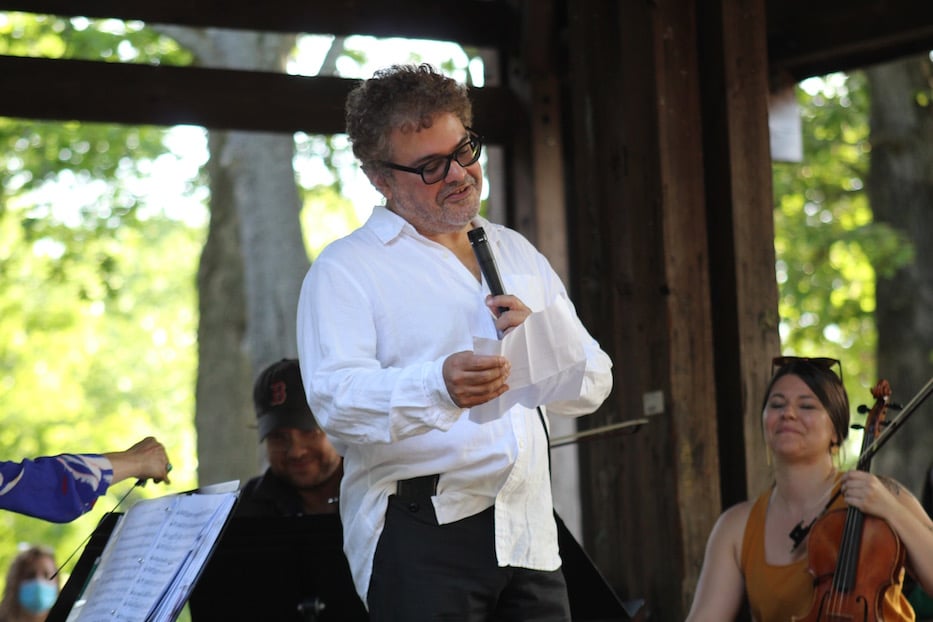
Madrid-based composer Luis Gustavo Prado.
The sense that this transition is the natural order of things—and that it has been a long time coming—was very much on display earlier this month, as a “Quartet Time Machine” touched down in College Woods. After a return to in-person lessons and concerts this year, students, resident musicians and Haven String Quartet members Annalisa Boerner, Philip Boulanger, Gregory Tomkins and Yaira Matyakubova stepped into the spotlight outdoors.
They came with a special guest: Madrid-based composer Luis Gustavo Prado, whose Suite de Canto y Danza en Forma de Variaciones was written in 2020 with the organization’s students and teaching faculty in mind. Across multiple movements, Prado traces the influences of Mexican, South and Central American, Afro-Caribbean and Cuban music on the sonic landscape of the 21st century.
He said he was especially interested in probing how much of the music scores a history that was not taught to him in years of formal music education. In his “Ranchera,” for instance, he nods directly to a form of music that sprouted from the Mexican Revolution at the beginning of the twentieth century. In “la Danza puertorriqueña,” violin sings slowly over the cello, replicating a folkloric waltz laced with nineteenth century colonial influences. It yields to an exhilarating Zapateado, where a listener can hear in the strings exactly where footfalls would otherwise be.
“I just want to spread this happiness,” said Prado as the group drew from a repertoire that included Jesse Montgomery, Johann Sebastian Bach, Roberta Flack, Consuelo Velázquez, Stevie Wonder and The Drifters. “We are doing a very slow premiere [of this work]. I love these songs, so much, and they are very intricate. They’re so full of detail.”
Around him, sweet personal histories emerged from the woodwork. Before playing Prado’s arrangement of Stevie Wonder’s “I Just Called to Say I Love You,” Matyakubova recalled growing up in Uzbekistan, and knowing only the chorus. When she heard it, “it was like time travel into the past,” she said. When musicians dipped into “Up On The Roof,” a few listeners began to sway to the sound of the 1960s. As the quartet played, Jackson scurried around handing out boxes from Madeline’s Empanaderia (co-owner Hazel Lebron is a Music Haven parent).
As one piece of history melted right into the next, it became a reminder of the work that Jackson, McClain and Music Haven’s teachers together have done to grow culturally relevant and responsive programming for years. In addition to the celebrated pantheon of dead white men students still play—yes, it turns out that Bach and Shostakovich will never go out of style—they’ve worked to fold in historic and contemporary names that might be less familiar, including Montgomery, Nicholas Lell Benavides, Samuel Coleridge-Taylor and most recently Rahim Alhaj.
They’ve also mixed music with an exhibition from Miguel Angel Mendoza, a Mexican artist who lives in New Haven’s East Rock neighborhood, invited oud and poetry onto the stage, and experimented with commissions for the first time in the group’s history. Prado’s work, for instance, is written with multiple variations, such that it can be played by a professional quartet or a full string orchestra like Music Haven’s Harmony in Action.
“This is just the beginning,” he said in an interview after the concert, and it was as if he was talking about the piece and about Music Haven itself. “There are many versions and possibilities that we will do in the future.”
Students, too, are excited for the future of the organization—and at least on a recent weeknight, agreed that it is a very bright one. After playing in “Quartet Time Machine,” students Adina Salahuddin, Ayana Salahuddin, Jocelyn Francisco, Emily Campos and Maelle Davenport all said they’re grateful for the organization, and plan to stay with it for as long as they can.
Francisco, a violist and aspiring teacher who graduated from Cooperative Arts & Humanities High School this month, said that she has loved her studies under Boerner at Music Haven. After going remote in 2020, “it felt amazing” to come back last fall, she said. Working over a screen for a year, she and Boerner struggled with basic tasks, like instrument adjustment and positioning, or fixing a snapped string.
“When I came back, it just felt like I was home,” she said. “This year, I’ve been there almost every day.” This year, she won’t be too far away from Music Haven: she plans to continue her studies at Southern Connecticut State University (SCSU).
Davenport, a young cellist and dancer who is going into the eighth grade at Betsy Ross Arts Magnet School, said that playing in-person again has given her a chance to refocus. While she continued her lessons with Boulanger during the height of the pandemic, she struggled to concentrate. She described a singular kind of joy that she feels when she’s able to play with friends in Harmony In Action.
Ayana Salahuddin, a rising junior at New Haven Academy, called this year “a rebirth of coming back to my passion.” Prior to the pandemic, she said, she wasn’t “100 percent in it.” Studying under Matyakubova, she said she struggled to stay engaged as classes went remote. Returning, “there was a spark for me,” she said. She already gets verklempt thinking of how she is entering her final two years with the organization.
“It feels so good to be back,” chimed in her younger sister, Adina. “To be together and to play together.”
To learn more about Music Haven, visit the organization's website.

